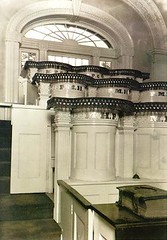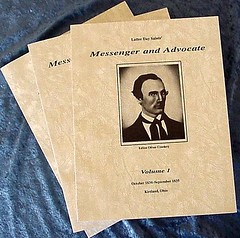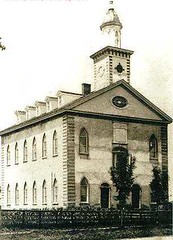Mitt Romney--The Candidate to Watch in 06
"Latter-day President": So reads the title of today's featured article, by James Taranto in The Weekend Interview in The Wall Street Journal. Mitt is getting some serious press, since announcing his retirement as Massachusetts' governor, and the speculation that means he is on the fast track to the White House:
Another blog viewpoint worth reading on Mitt is here at Outside the Beltway. Still another very pro Mitt Romney blog is here, The Elect Mitt Romney Blog.
Mitt Romney had a successful career in management consulting and capital management, culminating with a stint as CEO of Bain & Co. In 1994 he made his first political run, challenging Sen. Ted Kennedy. Even that year's Republican tide was not enough to drown Mr. Kennedy, who won 58% to 41%. Yet Mr. Romney's showing remains the best of any challenger Mr. Kennedy has faced. Mr. Romney got high marks for turning around the debt- and scandal-plagued organizing committee for Salt Lake City's 2002 Winter Olympics, and in 2002 he defeated Democrat Shannon O'Brien to become the Bay State's fourth consecutive GOP governor.Taranto also heralds Mitt's conservative credentials given that he governs the most Blue state in the country:
Not Mr. Romney, whose views put him well within the mainstream of GOP conservatism. A self-described "fiscal hawk," he takes credit for staving off tax increases, no mean feat given that the Democrats have a veto-proof legislative majority. When he took office, the state had a $3 billion budget deficit. "We held the line on taxes, we did not borrow more money, and instead we cut back on state programs," closing the gap. He hopes next year to persuade the Legislature to cut the top income tax rate to 5% from 5.3%.On the Mormon issue, Taranto notes:
A crucial question will be whether Mr. Romney's religion is a handicap. The Church of Jesus Christ of Latter-day Saints is indigenous to America, but many Americans view it with suspicion. In a 1999 Gallup poll, 17% of those surveyed said they would not vote for a Mormon for president, far more than said the same of a Jew (6%) or a Catholic (4%).Mitt presents as an interesting, and attractive candidate. So far the press coverage has by and large been positive. The Church, I think, also benefits from this coverage. My feeling is still that if he doesn't win the nomination outright in '08, look for Mitt to play an important role in a Republican administration assuming they re-caputre the White House in the next election.
In 1994 Sen. Kennedy made an issue of the LDS Church's tardy embrace of racial equality (it did not allow the ordination of blacks until 1978). "I don't think that's the reason I lost to Ted Kennedy," says Mr. Romney, and he's surely right. In any case, Mr. Kennedy doesn't seem to have any problem today answering to a Mormon Senate leader, Harry Reid.
Mr. Romney also says religion wasn't a problem for his father: "When he was running for president . . . he was the front-runner. His faith just didn't factor in. . . . His statement on Vietnam--that put him under, but certainly not his faith."
The trouble is that much of today's anti-Mormon sentiment is found on the religious right, a constituency that looms much larger in the GOP now than it did in 1968, or than it ever has in Massachusetts. Ask a conservative Christian what he thinks of Mormonism, and there's a good chance he'll call it a "cult" or say Mormons "aren't Christian."
Yet on the issues, Mr. Romney is largely in tune with the Christian right. "I am pro-life," he says, though he's not an absolutist. He favors a return to the status quo ante Roe v. Wade, when states decided abortion policy. In 2002, recognizing that Massachusetts is an "overwhelmingly pro-choice state," he campaigned only on a promise to veto any legislation changing the state's abortion laws, including a proposal, which Ms. O'Brien endorsed, to reduce the age of parental consent to 16 from 18. The Legislature never passed that measure . . .
How would he overcome anti-Mormon prejudice if he seeks the presidency? He doesn't answer directly, but cites his experience in Massachusetts: "As people got to know me . . . they accepted me for who I am, and religious doctrines didn't make much difference to them."
In the end, there's probably not much Mr. Romney can do about the "Mormon problem" other than put his faith in the American tradition of religious pluralism. "I think our nation needs people of faith in public service," he says. "My policies in the public sector are not a mirror image of any church's doctrines. But of course the respect I have for American values flows from the faith that I have." If Mr. Romney runs for president, it may test the proposition that the religious right is an issues-based movement as opposed to a sectarian one.
Another blog viewpoint worth reading on Mitt is here at Outside the Beltway. Still another very pro Mitt Romney blog is here, The Elect Mitt Romney Blog.







0 Comments:
Post a Comment
<< Home